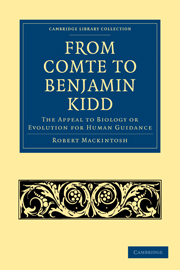Book contents
- Frontmatter
- PREFACE
- Contents
- CHAPTER I INTRODUCTORY
- PART I COMTISM, WITH SOME SCATTERED PARALLELS
- PART II SIMPLE EVOLUTIONISM—SPENCER, STEPHEN
- PART III DARWINISM, OR STRUGGLE FOR EXISTENCE
- CHAPTER XI “DARWINISM IN MORALS”—MISS COBBE'S PROTEST
- CHAPTER XII DARWINISM IN POLITICS—BAGEHOT
- CHAPTER XIII DARWINISM IN ETHICS—PROFESSOR ALEXANDER
- CHAPTER XIV REACTION FROM DARWINISM—HUXLEY
- CHAPTER XV REACTION FROM DARWINISM—DRUMMOND's “ASCENT OF MAN”
- CHAPTER XVI REITERATION OF DARWINISM: ELIMINATION MADE ABSOLUTE—MR. A. SUTHERLAND
- CHAPTER XVII THE METAPHYSICS OF NATURAL SELECTION
- PART IV HYPER-DARWINISM—WEISMANN, KIDD
- Index
CHAPTER XI - “DARWINISM IN MORALS”—MISS COBBE'S PROTEST
Published online by Cambridge University Press: 29 August 2010
- Frontmatter
- PREFACE
- Contents
- CHAPTER I INTRODUCTORY
- PART I COMTISM, WITH SOME SCATTERED PARALLELS
- PART II SIMPLE EVOLUTIONISM—SPENCER, STEPHEN
- PART III DARWINISM, OR STRUGGLE FOR EXISTENCE
- CHAPTER XI “DARWINISM IN MORALS”—MISS COBBE'S PROTEST
- CHAPTER XII DARWINISM IN POLITICS—BAGEHOT
- CHAPTER XIII DARWINISM IN ETHICS—PROFESSOR ALEXANDER
- CHAPTER XIV REACTION FROM DARWINISM—HUXLEY
- CHAPTER XV REACTION FROM DARWINISM—DRUMMOND's “ASCENT OF MAN”
- CHAPTER XVI REITERATION OF DARWINISM: ELIMINATION MADE ABSOLUTE—MR. A. SUTHERLAND
- CHAPTER XVII THE METAPHYSICS OF NATURAL SELECTION
- PART IV HYPER-DARWINISM—WEISMANN, KIDD
- Index
Summary
It is not necessary again to recapitulate the leading points of Darwinism. Nor is it desirable to pause at present in order to weigh some very grave metaphysical objections to the terminology and conceptions with which Mr. Darwin went to work. We are more concerned to ask how Darwinian ideas have affected the theories of morals or of society which follow biological lines.
Now plainly there is an ambiguity here. In the previous chapters, for the most part, we have been dealing with a scientific analogy,—consciously lifted out of one region of thought and introduced into another,—coming no doubt with a great deal of authority, but still presenting itself to view, and continuing to be regarded, as a foreign visitor. We shall still find such a course followed in some instances by writers who are employing Darwinian clues and modes of thought. The doctrine of struggle for existence may be applied to other things besides plants or animals,—to competing states, or types of society, or types of ethical thought. But there is a nearer way in which Darwinism may bear upon our problems. Man himself as an organism is brought within the range of Darwinian theories. In connection with the assertion of man's descent from brute races, fresh light—of a lurid kind, as many will think—is made to fall upon the problems of ethics; and questions as to social origins will run back into questions regarding human origin by process of evolution.
- Type
- Chapter
- Information
- From Comte to Benjamin KiddThe Appeal to Biology or Evolution for Human Guidance, pp. 110 - 114Publisher: Cambridge University PressPrint publication year: 2009First published in: 1899

